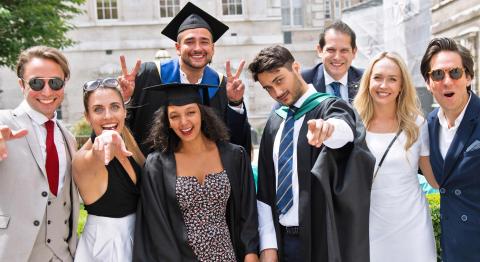Sponsored content: created in partnership with the European School of Economics.
Operating under a unique teaching model, the European School of Economics (ESE) has earned a reputation as one of the most competitive private business schools on the market. It stands out from other business schools and universities by having five centres around the world for its students to call home, located in London, Rome, Milan, Florence and Madrid. That’s why ESE proudly calls itself a business school without borders.
“I had an aim of moving between centres from the very beginning of my journey with ESE,” says Thea Peters, a business administration student at ESE who recently completed her third year of studies. “I am from Sweden originally but wanted a British education as well as the chance to study in another country. So I started in Italy’s Florence campus before moving to the centre in London.”
Ricardo Bianchi, a business administration student who is about to start his third year, had a similarly positive experience with ESE’s international approach to learning. “Studying at the London centre has been enriching,” he says. “Although I haven’t moved between centres, the option to switch to the Milan centre in my hometown is a big advantage. This adds adaptability to my educational journey.”
The flexibility ESE offers extends to other practical aspects of the academic journey, such as internships and work placement opportunities. Peters says that students can start internships at different times of the year and work with administrators to build on their experience.
“ESE’s internship and work placement opportunities are closely linked with the academic curriculum,” Bianchi says. “The internship team helps secure a two-month job related to each student’s specialisation. For me, this meant an internship in finance, which enhanced my learning by helping me apply classroom knowledge in real-world settings. These experiences have refined my career aspirations and guided my future decisions.”
The internships and work placements at ESE are supported by a three-way contract between industry partners, students and the school, says Peters. “This collaborative approach means there is always a clear understanding of what you need to learn and what you have learnt already as well as the school’s principles and fundamentals.”

Thea Peters, a business administration student at the European School of Economics
Bianchi says that mentorship from industry partners significantly contributes to students’ academic development at the school. “ESE connects students with experienced professionals who offer guidance, share insights and provide feedback, bridging the gap between theory and practice.”
Another way that ESE sets itself apart from other higher education institutions is its small class sizes, which range from 10 to 25 students. This helps to enhance mentorship opportunities and facilitate personalised support. “Personalised mentorship is always available but students still need to take accountability for their own studies,” Peters says. “There is support and autonomy.”
Diego Simonis, who grew up in Belgium and Morocco, came to London to pursue a three-month short course in music industry management at ESE. Simonis studied business in the Netherlands and took part in the Erasmus+ programme in Paris. He decided to join ESE’s London centre to diversify his language skills and build connections in the music industry. “London has been the best experience for me,” says Simonis. “People are more open and want to work with you and are interested in your work.”

Diego Simonis, a former student at the European School of Economics
Simonis especially enjoyed working with Jake Broido, a professor at ESE who has managed acclaimed musicians such as Charlie Puth. Simonis adds that Broido’s advice on networking has been invaluable. Since completing his course in April, Simonis has developed a successful portfolio, which currently includes a number of artists and music industry lawyers. “You need to work hard and look out for opportunities,” he says. “ESE’s network and support ensure that students’ hard work translates into their professional dreams and expectations.”
Find out more about the European School of Economics.

Comments